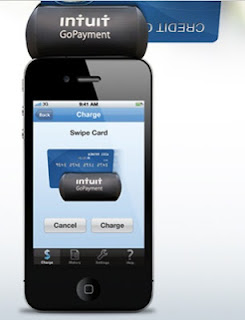Being a lawyer is my job. It is how I earn my living. It is how I pay my bills. My law practice is intended to be a for profit venture (although as a family law lawyer that can be challenging). I began accepting credit card payments a few years ago, and it has proven to be a boon for my bottom line! I accept credit cards for client payments on outstanding balances, and I also accept credit cards when clients deposit their retainers.
In my case I utilize Intuit GoPayment Merchant Services. The service integrates with Quick Books, which we use in our office. There is a clean, easy to use interface with Quick Books. I have a credit card swiper attached to my computer and I can process transactions right from my desk. Alternatively Intuit has a mobile reader and smartphone app called GoPayment that allows me to swipe credit cards right from my iPhone or iPad. The mobile app is pretty sweet, and clients get a kick out of being able to sign with their finger on the iPad screen. When I swipe a card the merchant fee (i.e., the commission that I pay to Intuit) is less than 2% of the value of the total transaction. Square also has a convenient credit card processing service, include mobile apps and swipers.
Accepting credit cards makes my collections efforts much easier. Everyone has at least one credit card, so it is hard for the client to avoid pulling it out and using it to pay me. If a client has a credit card, they almost always have it with them. If a client owes me money, I can insist that the credit card gets put on the table right then and there. That differs greatly from the "I forgot my check book" line. The credit card money gets deposited into my bank account in a day or two, and I don't have to make a trip to the bank to deposit the check.
Sure clients will complain about the high interest that the credit card company will charge them, but that is for them and the credit card company to fight about. I need to get paid to stay in business, and the client needs to appreciate that. As a business operator I am giving the customer alternatives for paying for my services. They have to choose which option to utilize. Not paying is not an option if the client wants my continued representation.
A word on trust fund deposits/retainers. When you receive a credit card payment that pesky merchant service fee comes right off the top. For example, if you are paying 2% to the credit card company a $1000 charge results in $20 going to the credit card company, and $980 getting deposited into your account. This can give rise to commingling and mishandling of trust fund money problems. If you collect a $1000 retainer from a client, you need to post $1000 to your IOLTA account. You want to make sure you have a dual transaction merchant account. My account with Intuit GoPayment it is set up so that the full amount of the transaction is deposited into my trust account, and the service fee is withdrawn from my operating account. Using our $1000 example, the full $1000 is deposited into my IOLTA, and the $20 merchant fee comes out of my operating account as a second transaction. No commingling. No premature or inappropioate charge to the client (and no, you cannot pass the merchant service fee throught to the client as a cost). Many merchant service providers have this dual service, you just have to make sure to set it up that way. As I mentioned, GoPayment has dual transaction. LawPay is a service specifically for lawyers, and it does dual transactions. As of the date of this post Square does not, so that service will not work for retainers.
Please visit hardinglaw.com for more information about Harding & Associates Family Law
#Harding&AssociatesFamilyLaw #californiafamilylaw #divorce #family law #superlawyers #americanacademyofmatrimoniallawyers #Pleasantondivorce #AlamedaCountyDivorce #ContraCostaCountyDivorce #lawyers
A blog space for technology, marketing, and practice management musings directed at the family law lawyer.
Subscribe to:
Post Comments (Atom)
Solo nets Supreme Court win!
I know this has nothing to do with technology, but I think it is pretty cool. Andrew Simpson is a sole practitioner in the U.S. Virgin Is...

-
One of my favorites shows to watch on television as a kid was Hogan's Heros . My how it amused me as time and again the misfit prisoners...
-
Think of traditional law firm letterhead... Black on white. Solid blocks of text. Engraved printing. Rich, traditional, and strong. Not...
-
We have used Amicus Attorney for years. I have always loved the awesome graphics of the program, and the potential it carries. I have alwa...




No comments:
Post a Comment